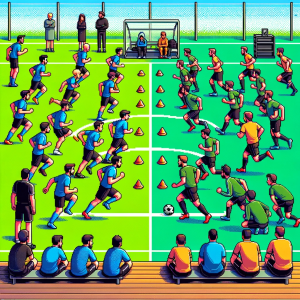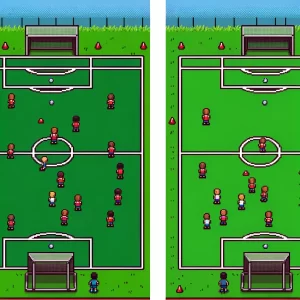
The Path to Soccer Stardom: Insights from the 2022 FIFA World Cup
The world of soccer is filled with young talents dreaming of World Cup glory. The recent study An early start at a professional soccer academy is no prerequisite for world cup soccer participation sheds new light on the age at which top players start their journey in professional academies. This blog aims to decode the study’s findings and its implications for soccer coaching and player development.
The Study at a Glance
This comprehensive study delved into the youth careers of 829 players from the 2022 Men’s World Cup in Qatar, focusing on their start in professional academies.
The key takeaway?
The median age for starting in a pro academy was 13.2 years, but with a wide range (4.2-22.6 years). European players generally started younger than their counterparts from other continents. Intriguingly, forwards began their professional journeys earlier than goalkeepers.
Implications for Soccer Coaching
- Diverse Paths to Success: The study highlights the varied pathways to elite soccer, challenging the notion of a ‘one-size-fits-all’ approach. Coaches should recognize that late bloomers can reach the top levels, encouraging a more inclusive and patient development strategy.
- Cultural and Continental Variations: The earlier start in European academies suggests a cultural influence on development. Coaches in non-European contexts might need to adapt their strategies to maximize the potential of players who start later.
- Position-Specific Insights: The finding that forwards start younger could influence how coaches scout and train young talents. Goalkeepers might benefit from a tailored approach considering their later start in the sport.
Player Development: A New Perspective
- Broadening the Talent Pool: This study underscores the importance of not overlooking players who start their professional journey later. Talent development programs should be flexible, accommodating players who show potential at different ages.
- Cultural Diversity in Training: As the study shows significant differences in start ages across continents, incorporating diverse training methodologies and cultural insights could be beneficial in player development.
- Focus on Individual Growth: With varied starting ages, the emphasis should be on individualized development plans, catering to the unique journey of each player.
Conclusion
This study debunks myths about the necessity of an early start in professional academies. It opens doors for a more inclusive and diverse approach to soccer coaching and development. Aspiring coaches, players, and enthusiasts should delve into this study to understand the multifaceted nature of soccer excellence.
For Further Exploration
For a deeper dive into the study and its comprehensive findings, check out the full article here.
Are you ready to delve deeper into the science and strategy of soccer?
This Week in Soccer offers you a unique blend of expert analysis, engaging infographics, and practical insights. Subscribe to our newsletter and stay ahead of the game with the latest in soccer analytics and coaching strategies. Make the move from spectator to strategist. Subscribe now!



